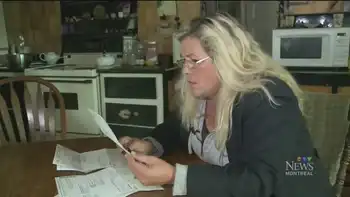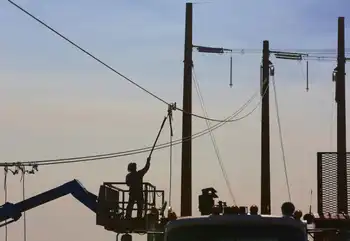Taltson Hydro Electric Heating directs surplus hydro power in the South Slave to space heat via discounted rates, displacing diesel and cutting greenhouse gas emissions, with rebates, separate metering, and backup systems shaping adoption.
Key Points
An initiative using Taltson's surplus hydro to heat buildings, discount rates replace diesel and cut emissions.
✅ 6.3 cents/kWh heating rate needs separate metering, backup heat
✅ 4-6 MW surplus hydro; outages require diesel; rebates available
✅ Program may be curtailed if new mines or mills demand power
A Northwest Territories green energy advocate says there's an obvious way to expand demand for electricity in the territory's South Slave region without relying on new mining developments — direct it toward heating.
One of the reasons the N.W.T. has always had some of the highest electricity rates in Canada is that a small number of people have to shoulder the huge costs of hydro facilities and power plants.
But some observers point out that residents consume as much energy for heat as they do for conventional uses of electricity, such as lighting and powering appliances. Right now almost all of that heat is generated by expensive oil imported from the United States.
The Northwest Territories Power Corporation says the 18-megawatt Taltson hydro system that serves the South Slave typically has four to six megawatts of excess generating capacity, even as record demand in Yukon is reported. It says using some of that to generate heat is a government priority.
But renewable energy advocate and former N.W.T. MP Dennis Bevington, who lives in the South Slave and heats his home using electricity, says the government is not making it easy for people to tap into that surplus to heat their homes and businesses, a debate that some say would benefit from independent planning at the national level.
Discount rate for heating, but there are catches
The power corporation offers hydro electricity from Taltson to use for heating at a much lower price than it charges for electricity generally. The discounted rate is not available to residential customers.
According to the corporation, consumers pay only 6.3 cents per kilowatt hour compared to the regular rate of just under 24 cents, while Manitoba Hydro financial pressures highlight the risks of expanding demand without new generation.
But to distinguish between the two, users are required to cover the cost of installing a separate power meter. Bevington, who developed the N.W.T.'s first energy strategy, says that is an unnecessary expense.
Taltson expansion key to reducing N.W.T.'s greenhouse gas emissions, says gov't
"The billing is how you control that," he said. "You establish an average electrical use in the winter months. That could be the base rate. Then, if you use power in the winter months above that, you get the discount."
Users are also required to have a back-up heating system. Taltson hydro power offers heating on the understanding that when the hydro system is down — such as during power outages or annual summer maintenance of the hydro system — electricity is not available for heating.
The president and CEO of the power corporation says there's a good reason for that. "The diesels are more expensive to run and they're actually greenhouse gas emitting," said Noel Voykin. "The whole idea of this [electric heat] program is to provide clean energy that is not otherwise being used."
According to the corporation, there have been huge savings for the few who have tapped into the hydro system to heat their buildings, and across Canada utilities are exploring novel generation such as NB Power's Belledune seawater project to diversify supply.
It's being used to heat Aurora College's Breynat Hall, and Joseph B. Tyrrell Elementary School and the transportation department garage in Fort Smith, N.W.T. Electricity is also used to heat the Jackfish power plant in the North Slave region.
The corporation says that during a four-year period, this saved more than 600,000 litres of diesel fuel and reduced greenhouse gas emissions by about 1,700 tonnes.
Bevington says the most obvious place to expand the use of electrical heat is to government housing.
"We have a hundred public housing units in Fort Smith," he said. "The government is putting diesel into those units [for heating] and they could be putting in their own electricity."
Heating a tiny part of energy market
The corporation says it sells only about 2.5 megawatts of electricity for heating each year, which is less than four per cent of the power it sells in the region. It says with some upgrades, another two megawatts of electricity could be made available for electrical heat.
Bevington says the corporation could do more to market electricity for heating. Voykin said that's the government's job. There are three programs that offer rebates to residents and businesses converting to electric heating.
If you build it, will they come? N.W.T. gov't hopes hydro expansion will attract investment
There are better options than billion dollar Taltson expansion, say energy leaders
There may be a reason why the government and the corporation are not more aggressively promoting using surplus electricity in the Taltson system for heating, as large hydro ambitions have reopened old wounds in places like Quebec and Newfoundland and Labrador during recent debates.
It is anticipating that new industrial customers may require that excess capacity in the coming years, and experiences elsewhere show that accommodating new energy-intensive customers can be challenging for utilities. Voykin said those potential new customers include a proposed mine at Pine Point and a pellet mill in Enterprise, N.W.T., even as biomass use faces environmental pushback in some regions.
The corporation says any surplus power in the system will be sold at standard rates to any new industrial customers instead of at discount rates for heating. If that requires cutting back on the heating program, it will be cut back.
Related News












